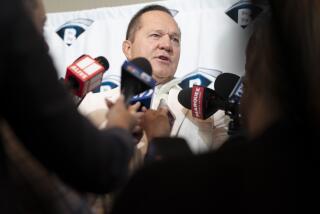Owners Make Slight Move
- Share via
A day after blasting players for seeking phased-in revenue sharing, baseball owners made a new economic proposal Sunday in an effort to get labor talks back on track, moving slightly toward the union with a strike deadline later this week.
Management’s revised offer to the players’ union featured increased payroll-tax thresholds and reduced tax rates. During negotiating sessions in New York, owners also proposed a small decrease in the amount of local revenue they want clubs to share, and modified points in their plan for steroid testing.
The movement occurred as the sides continued to chide each other in dueling conference calls with reporters, expressing frustration about Saturday’s contentious events that could have put them on a collision course to baseball’s ninth work stoppage in 30 years with another strike set to begin Friday.
Rob Manfred, management’s lead labor lawyer, ended his optimistic characterization of talks in ripping union head Don Fehr for proposing phase-ins, triggering a night of sniping. But Manfred led his team back to the table Sunday with a proposal, deciding that “the best way to find out if they were serious about making an agreement was to put whatever happened [Saturday] night to one side, make a forthcoming proposal and see if they could manage to do the same thing.”
The union was not overjoyed with the owners’ economic proposal, which it hoped would move much closer to its position, and their amendments to steroid testing also have not completely bridged the gap.
“While they did make some small movements in those areas, the luxury tax thresholds remain very, very low and constitute a big problem for us at this point,” Fehr said. “The differences continue to be narrowed [on steroid testing] and there still are some. We think we have come a very, very long way from the position that the players have traditionally taken on these issues.”
Players believe management is not doing enough to avert a strike.
“It’s getting to the point where it’s a joke to me,” said catcher Paul Lo Duca, the Dodger player representative. “We’ve given them everything they wanted. We make a proposal and they go straight to the press with it. It’s almost like, ‘What more do they want?’ It seems like we’re trying and they’re not, and they’re making us out to be the enemy. That’s a little upsetting.
“All the fans think we’re greedy, that we’re doing this to get paid. You know what? We’re negotiating with billionaires. It seems like it’s six or eight [hawk owners]. What about the 22 other owners? You never hear from them. We come down farther and farther, and they come up a bit, and we’re the bad guys.
“It’s getting to the point now where we’ve given a lot. When are they going to give something? I’m not talking about [Dodger Chairman Bob Daly]. He wants to play.”
Under management’s new proposal, clubs would share 36% of local revenue, an increase from 20% this season. Owners had previously sought 37% revenue sharing and the union Saturday raised its figure to 33.3%.
Management’s plan would now transfer $263 million from high-revenue to low-revenue clubs next season, based on 2001 figures. The union proposal would eventually transfer $242.3 million--but only in the final year of the agreement. Its plan calls for transferring $172.3 million in 2003, $195.6 million in 2004, $219 million in 2005 and $242.3 million in 2006.
Manfred acknowledged the union had broached the subject of phase-ins, but not at a level that would increase revenue sharing about only $3 million next season from its current level of $169 million. Owners want the plan to be implemented fully next season to slow salary growth. Because of the phase-ins, the sides are $222.8 million apart on the revenue sharing transfer number.
“If you don’t have any phase-ins, then the [New York] Yankees’ burden increases from $28 million to approximately $57 million in revenue sharing [using the union model],” Fehr said. “They would pay another huge amount, perhaps up to $25 million, in luxury taxes.
“Nobody, not even the Yankees, can absorb that kind of hit to their financial structure at once. Nobody ever expects them to. Nobody ever thought it would turn out that way. From our point, phase-ins are going to be integral parts of this deal.”
And that continues to upset owners.
“The notion that their proposal for 2003 is a transfer of $172 million, when us and the rest of America thought it was for $235 million, is a bit of a problem,” Manfred said. “If they can’t manage to make a proposal that corrects the directional problem that they had [Saturday], we will not continue to move toward them.”
The payroll tax remains the biggest hurdle. Owners, determined to slow spending of high-revenue teams, are demanding the tax that the union, in conjunction with increased revenue sharing, views as a salary cap by another name.
Owners increased their threshold to $107 million in the first three years of the new contract and to $111 million in 2006. Based on projections, seven teams would be affected under those thresholds.
The union has proposed thresholds of $125 million next year, $135 million in 2004 and $145 million in 2005. Also at issue is the union’s opposition to a tax in the final season of the deal, and the tax rates.
Owners want teams to be taxed at 35% the first time they exceed the threshold, 40% the second time, 45% the third time and 50% the fourth time. Players have proposed rates of 15% to 40%.
“They think we’re bluffing,” Lo Duca said. “We’re not.”
*
Staff writer Mike DiGiovanna contributed to this report.
More to Read
Are you a true-blue fan?
Get our Dodgers Dugout newsletter for insights, news and much more.
You may occasionally receive promotional content from the Los Angeles Times.






